“If we all continue to be involved in research, I am truly hopeful that one day there could be a cure, one day,” Reggie.
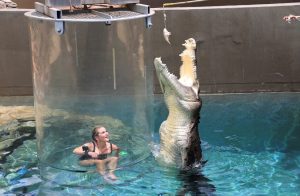
Independent and sporty
In her childhood and into early adult hood, Reggie loved sport. She used to play soccer through primary school and right up to the age of 29 years old. “I represented Tassie back in the day playing soccer at about 16 years old. I was also very good at swimming and running at school. My older brother and younger sister and I were all very independent as my mother had paranoid schizophrenia and my father was away a lot for work as a merchant seaman.”
I can’t see in the dark
Reggie could always remember that she could never see in the dark. As she had been busy working 14 hours a day and 7 days a week in her early adulthood at her own fish and chip shop, she never went out much at night. Although she would tell people she couldn’t see in the dark, they would say “no one can see in the dark.”
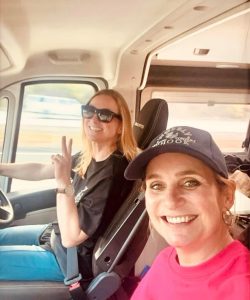
However, it wasn’t until she starting training for cabin crew at Virgin at the age of 29 that she began to understand that she actually had an eye condition. At the training, on one particular day, the team were learning to work with people with a disability. A vision impaired woman began explaining that when her eye sight started to deteriorate, the first thing she noticed was that she couldn’t see in the dark.
As a result, Reggie had her eyes checked by an optometrist and then by an ophthalmologist. Reggie didn’t think too much about her diagnosis of retinitis pigmentosa (RP), an inherited retinal disease that causes vision loss. Then about 5 years later, when her daughter was 6 months old and crawling around on the floor Reggie realised she kept tripping over her. Her partner suggested she have her eyes tested again as she was also bumping into furniture. Then, on that day, at age 34 her ophthalmologist told her to stop driving. “That day I was a mess,” she recounts.
Current vision
Explaining her current vision Reggie says, “I have 9 degrees of pin hole vision left and it is very limited. It is like looking through a straw and I am starting to get lines on my forehead from squinting all the time as I am constantly trying to concentrate.”
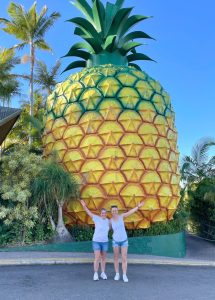
To help improve her sight, Reggie had her cataracts removed three years go. Although the surgery did help at first, the vision in her right eye is now becoming blurry, while the left remains ok.
Reggie was diagnosed last year with Usher syndrome, a genetic condition which results in hearing and vision loss. Reggie doesn’t have to worry about her hearing at this stage as her recent hearing tests show no cause for concern.
Profession
Reggie has an outgoing personality and would love to do waitressing again but as she explains, “I can’t, I will be banging into everything. I am good with people. At the moment, I am trying to get my act together to write a book and get on the speaker circuit and talk to people. I would like to talk to people and help educate about my eye condition.”
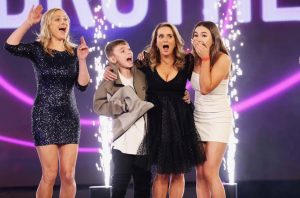
“In 2003 I went on Big Brother and won and won it again last year. I was proud of both and prouder of winning last year as I was representing people with vision loss and low vision. It was good to be on Big Brother and important to get the message across about my eye condition especially as my eyes do not look any different from a person without vision loss. As a result, some people do not realise I have vision loss.”
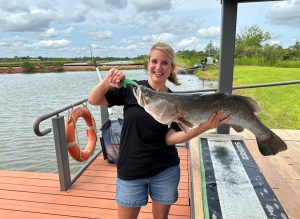
“I would give anything to drive or to see properly again.”
Using a white cane
Reggie wears a badge stating she has vision loss. She also uses a white cane and has done so for the past 12 years. Initially embarrassed and confronted by the need for a white cane, Reggie has embraced the independence she can have with it. If she forgets it at home, she feels anxious and uneasy in a new or unfamiliar environment.
The future
Reggie explains, “I take each day as it comes. There is hope in a trial and hopefully one day there will be a cure. My son has cystic fibrosis and the current medication that he is on is because of clinical trials. So I have to give it a shot, I just have to give it a go.”
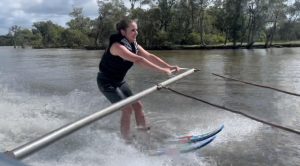
Reggie loves cooking and during the summer time, will head out on the jet ski with her partner. Her priority is her two children and last year she was involved in Great Strides to fundraise for cystic fibrosis. This month Reggie is the Ambassador for Fred Hollows and will be walking 150 kilometres in August for Fred’s Big Run, to fundraise in order to end avoidable blindness.
Click to read about clinical trials at QEI.
Inherited retinal diseases
In Australia there are about 16,000 people who have an inherited retinal disease (IRD) which is thought to be the leading cause of blindness in working age adults in this country. Worldwide, over 2 million people are living their lives with an inherited retinal disease.